- Products
Network & SASE IoT Protect Maestro Management OpenTelemetry/Skyline Remote Access VPN SASE SD-WAN Security Gateways SmartMove Smart-1 Cloud SMB Gateways (Spark) Threat PreventionCloud Cloud Network Security CloudMates General CloudGuard - WAF Talking Cloud Podcast Weekly ReportsSecurity Operations Events External Risk Management Incident Response Infinity AI Infinity Portal NDR Playblocks SOC XDR/XPR Threat Exposure Management
- Learn
- Local User Groups
- Partners
- More
This website uses Cookies. Click Accept to agree to our website's cookie use as described in our Privacy Policy. Click Preferences to customize your cookie settings.
- Products
- AI Security
- Developers & More
- Check Point Trivia
- CheckMates Toolbox
- General Topics
- Products Announcements
- Threat Prevention Blog
- Upcoming Events
- Americas
- EMEA
- Czech Republic and Slovakia
- Denmark
- Netherlands
- Germany
- Sweden
- United Kingdom and Ireland
- France
- Spain
- Norway
- Ukraine
- Baltics and Finland
- Greece
- Portugal
- Austria
- Kazakhstan and CIS
- Switzerland
- Romania
- Turkey
- Belarus
- Belgium & Luxembourg
- Russia
- Poland
- Georgia
- DACH - Germany, Austria and Switzerland
- Iberia
- Africa
- Adriatics Region
- Eastern Africa
- Israel
- Nordics
- Middle East and Africa
- Balkans
- Italy
- Bulgaria
- Cyprus
- APAC
AI Security Masters
E1: How AI is Reshaping Our World
MVP 2026: Submissions
Are Now Open!
What's New in R82.10?
Watch NowOverlap in Security Validation
Help us to understand your needs better
CheckMates Go:
Maestro Madness
Turn on suggestions
Auto-suggest helps you quickly narrow down your search results by suggesting possible matches as you type.
Showing results for
- CheckMates
- :
- Products
- :
- Network & SASE
- :
- Management
- :
- How can I quickly move from many objects in many r...
Options
- Subscribe to RSS Feed
- Mark Topic as New
- Mark Topic as Read
- Float this Topic for Current User
- Bookmark
- Subscribe
- Mute
- Printer Friendly Page
Turn on suggestions
Auto-suggest helps you quickly narrow down your search results by suggesting possible matches as you type.
Showing results for
Are you a member of CheckMates?
×
Sign in with your Check Point UserCenter/PartnerMap account to access more great content and get a chance to win some Apple AirPods! If you don't have an account, create one now for free!
- Mark as New
- Bookmark
- Subscribe
- Mute
- Subscribe to RSS Feed
- Permalink
- Report Inappropriate Content
Jump to solution
How can I quickly move from many objects in many rules to a reusable group?
Today I have multiple policies holding exactly the same set of objects (access roles/networks/hosts..) over and over in multiple rules. Due to scaling demands I keep adding more hosts to all those places.
How can R80.10 help me with making my management operations more efficient?
Labels
- Labels:
-
SmartConsole
- Tags:
- smartconsole
1 Solution
Accepted Solutions
- Mark as New
- Bookmark
- Subscribe
- Mute
- Subscribe to RSS Feed
- Permalink
- Report Inappropriate Content
We started hearing more about this case from customers, so I wanted to use this platform to demonstrate a suggestion for this.
It probably makes sense to use a group and reuse that one group across the many rules. It can reduce mistakes, and save time. R80.10 SmartConsole provides good audit logs about changes within the install policy dialog, in the audits overview, and on each rule using the 1-click Rule Objects Logs.
So how do we move to a group-oriented policy?
Step 1:
Do a "where used" on one of the repeating objects.
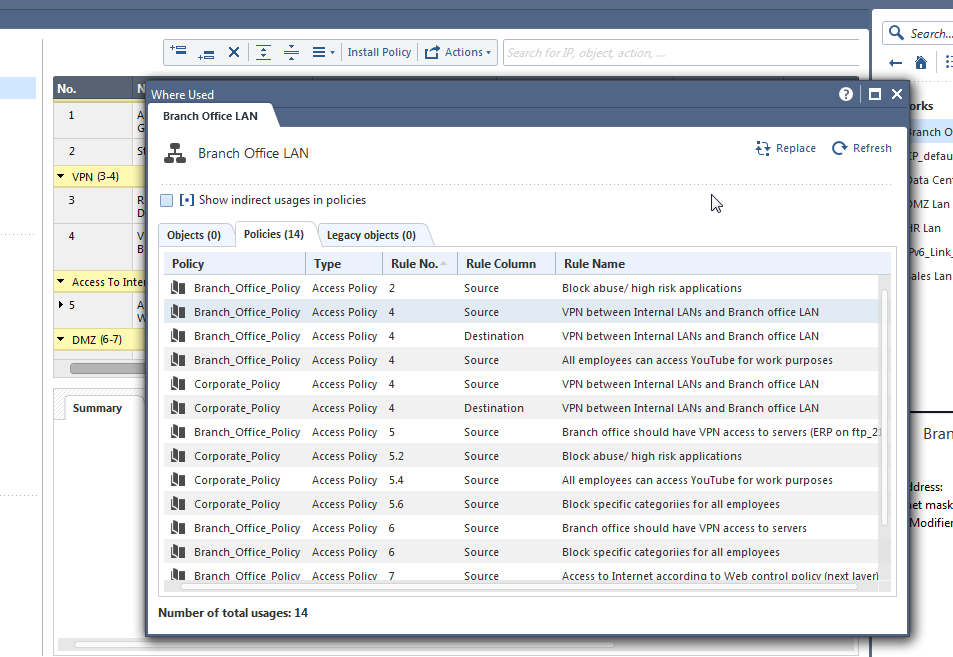
Step 2:
In the Where Used dialog, choose to replace this object with a new group.
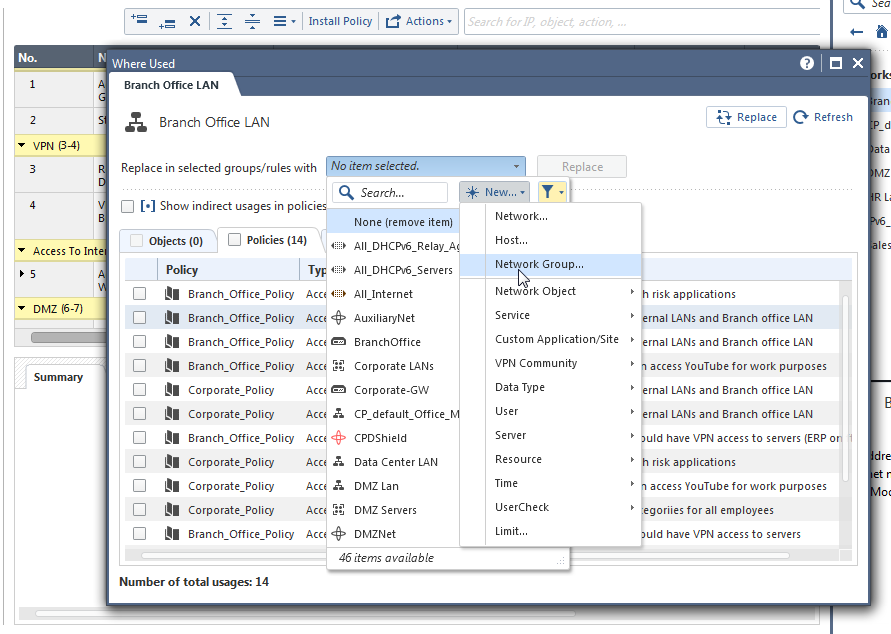
Step 3:
Add to that new group this searched object, as well as the other objects which you want to avoid repeating over and over and group them instead.
Tip: within the group members picker, use the filter icon to filter based on a specific category. In this case, all of our group members will be some of the Networks, so we can quickly get rid of the rest of the objects that show up in the picker by filtering on the Network category.
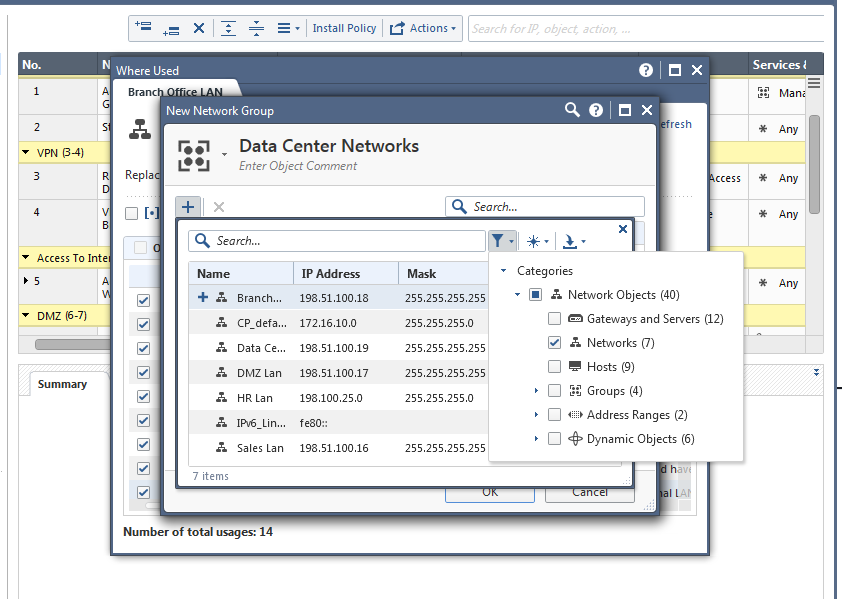
Step 4:
Add the remaining repeating objects to the group.
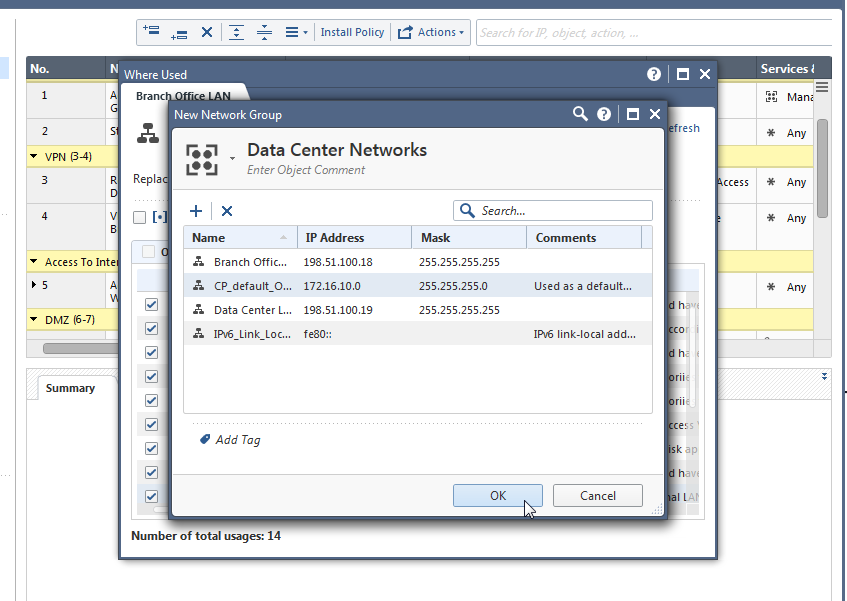
Step 5:
Click OK on the group dialog to automatically save these changes (on your private session, no one else sees them just yet)
Click Replace on this replacement from the where-used dialog.
Step 6:
For any object of the group members, find it on the Objects Bar or Objects Explorer, click on "Where Used", and replace it with "None (remove item)". Check the check-boxes near all the usage locations in which you included the group that contains this object (in step 5).
Click "Replace" to approve the replacement.
Repeat this step for the rest of the objects which you have contained within the group. After this, you will officially move from a "repeat yourself with many objects" approach to a "reusable group" approach.
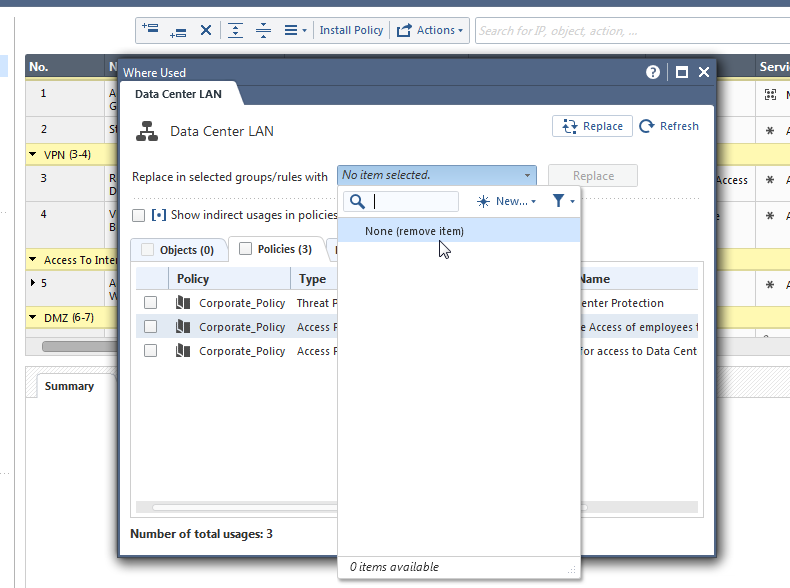
Send us your object management concerns with R80.10 (and maybe also pre-R80). We want to make more cases and tips like these across this community.
1 Reply
- Mark as New
- Bookmark
- Subscribe
- Mute
- Subscribe to RSS Feed
- Permalink
- Report Inappropriate Content
We started hearing more about this case from customers, so I wanted to use this platform to demonstrate a suggestion for this.
It probably makes sense to use a group and reuse that one group across the many rules. It can reduce mistakes, and save time. R80.10 SmartConsole provides good audit logs about changes within the install policy dialog, in the audits overview, and on each rule using the 1-click Rule Objects Logs.
So how do we move to a group-oriented policy?
Step 1:
Do a "where used" on one of the repeating objects.

Step 2:
In the Where Used dialog, choose to replace this object with a new group.

Step 3:
Add to that new group this searched object, as well as the other objects which you want to avoid repeating over and over and group them instead.
Tip: within the group members picker, use the filter icon to filter based on a specific category. In this case, all of our group members will be some of the Networks, so we can quickly get rid of the rest of the objects that show up in the picker by filtering on the Network category.

Step 4:
Add the remaining repeating objects to the group.

Step 5:
Click OK on the group dialog to automatically save these changes (on your private session, no one else sees them just yet)
Click Replace on this replacement from the where-used dialog.
Step 6:
For any object of the group members, find it on the Objects Bar or Objects Explorer, click on "Where Used", and replace it with "None (remove item)". Check the check-boxes near all the usage locations in which you included the group that contains this object (in step 5).
Click "Replace" to approve the replacement.
Repeat this step for the rest of the objects which you have contained within the group. After this, you will officially move from a "repeat yourself with many objects" approach to a "reusable group" approach.

Send us your object management concerns with R80.10 (and maybe also pre-R80). We want to make more cases and tips like these across this community.
Leaderboard
Epsum factorial non deposit quid pro quo hic escorol.
| User | Count |
|---|---|
| 17 | |
| 15 | |
| 8 | |
| 5 | |
| 5 | |
| 5 | |
| 5 | |
| 4 | |
| 4 | |
| 4 |
Upcoming Events
Thu 18 Dec 2025 @ 10:00 AM (CET)
Cloud Architect Series - Building a Hybrid Mesh Security Strategy across cloudsThu 08 Jan 2026 @ 05:00 PM (CET)
AI Security Masters Session 1: How AI is Reshaping Our WorldThu 18 Dec 2025 @ 10:00 AM (CET)
Cloud Architect Series - Building a Hybrid Mesh Security Strategy across cloudsThu 08 Jan 2026 @ 05:00 PM (CET)
AI Security Masters Session 1: How AI is Reshaping Our WorldAbout CheckMates
Learn Check Point
Advanced Learning
YOU DESERVE THE BEST SECURITY
©1994-2025 Check Point Software Technologies Ltd. All rights reserved.
Copyright
Privacy Policy
About Us
UserCenter


